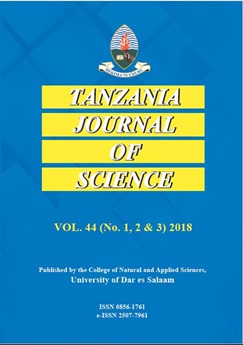Effects of Time on pH, Total Bacteria Counts, and Total Hydrocarbon Contents in the Bioremediation of Crude Oil Contaminated Soil Using Indigenous Bio-stimulants
Abstract
This study was conducted to investigate the effect of time on pH, total bacteria counts, and total hydrocarbon contents in the bioremediation of crude oil contaminated soil using pig waste and sawdust as bio-stimulants. Dried soil samples (500 g each) were weighed each into seven different plastic bowls, and each bowl was contaminated with 10 g of crude oil. Six of the contaminated soil samples in six of the plastic bowls were amended with a combination of pig waste and sawdust as bio-stimulants in the ratio of 1:1 in amounts of 150 g, 125 g, 100 g, 75 g, 50 g, and 25 g, while the seventh bowl served as control. The bio-stimulants were not added to the control sample. The effect of time on pH, total hydrocarbon contents (THC), and total bacteria counts (TBC) were monitored in all seven samples (test samples and control) for seven weeks. Results showed that changes in the pH values for the amended samples with masses 150 g, 125 g, 100 g, 75 g, 50 g, and 25 g were within the range of 6.00 €“7.00 (slightly acidic to neutral) which is suitable for most plants to thrive. There were relative increase and decrease in total bacteria counts with time reflecting an unsteady trend. There was also a steady decrease in THC with an increase in detention time in all samples which indicated steady decomposition of the crude oil contaminants during storage. Also, a significant level of bioremediation was achieved using the locally sourced biomaterials as amendments.
Keywords: Bioremediation; Biodegradation; Time; Contaminated soils; Bio-stimulant


